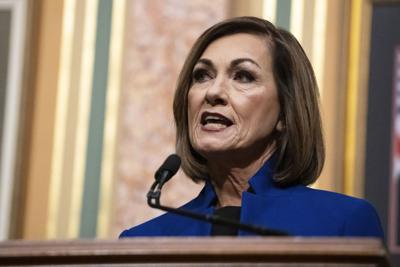Opinions remain split on Gov. Kim Reynolds’ bid to reform Iowa’s nine Area Education Agencies after the bill passed the Senate subcommittee Wednesday, but failed to advance through the House equivalent.
The controversial bill would give schools the option to keep the pass-through state funding that has historically gone to AEAs. While the bill has raised concerns from both voters and officials that, if passed, Iowa’s special education funding and resources would suffer, Reynolds argued in an interview with the Herald that transparency and options are needed with the AEAs, which she says cost more but produce lackluster results.
“Our focus has been on our students with disabilities. This system is failing our kids in that we spend $5,300 more [per student] than the national average with poorer results, and so we need to take a look at the system and figure out what we can do differently,” Reynolds told the Oskaloosa Herald in a phone interview.
In her breakdown of the current bill, which was amended from its original form on Monday, Reynolds highlighted the need for options, transparency and fiscal accountability in the AEAs.
“One of the areas that we were different than every other state is we take the special education funds and we go directly to the AEA, bypass the school districts, but then we mandate the school districts to use their services," Reynolds said. "So they have no recourse if they’re unhappy with them, and none of us really have any idea of what the cost of the services are."
“You can’t just transfer the money to an entity and then mandate that [school districts] use the entity and not have any recourse if you aren’t happy with the services that you’re receiving,” she added. “And then it’s just irresponsible not to understand what some of the costs of those services are, and so [the bill] will start to help, I think, identify that moving forward.”
The proposed reforms to the AEAs were a hot topic at Mahaska County’s Coffee and Conversation public forum on Saturday, Jan. 27, where a panel including Sens. Ken Rozenboom and Adrian Dickey and Reps. Helena Hayes and Barb Kniff-McCulla took questions from the crowd. Hayes announced at the forum that she is not in favor of the bill, citing concerns about fast-tracking of the process and not enough stakeholder input.
“This has to slow down,” Hayes told the crowd. “It has moved way too fast, people do not feel heard, and it should not be done in this session.”
She maintained her position after the bill failed to pass the House subcommittee Wednesday.
"I'm very pleased about this vote because I told everybody there that I was not in favor of it because there's absolutely no support for it," Hayes said.
Hayes does agree there is "room for improvement" in the AEAs, but insists that the process must slow down to allow for more stakeholder input.
Reynolds says the process for stakeholder input for the bill included hearing from educators and parents during her travels throughout Iowa and soliciting feedback from superintendents from districts of various sizes across Iowa and from parents.
“We had heard, first of all, there’s no consistency in the services that are being provided. Their AEAs are pulling teachers out of the classroom because they can pay them twice as much," she explained. "[Schools] can’t compete with the salaries that they’re providing, and then they’re not in the classroom dealing with the kids.”
The proposed bill also includes a measure that would invest $47.1 million in increasing the Iowa statutory minimum teacher salary from $33,500 to $50,000 and $25.8 million in increasing the statutory minimum teacher salary to $62,000 for teachers with 12 years of experience.
“I had multiple educators say they’re not getting the support that they need with the AEA,” Reynolds added. “I also hear good things, too. So, you know, there are AEAs that are doing a great job, and if that’s the case, with the amendment that they’ve proposed, this is the thing: Nothing has to change.”
“If [a school is] happy with the services that [they’re] providing, then you can continue to transfer the entire funding that you get to your AEA, and they can continue providing the services,” she added. “You are the customer. The school, the school board, they’re the customer, and you should be making that decision and at some point, you should know what the cost of those services are. I think it’s just unconscionable that there’s no transparency to that, and nobody knows what those services cost.”
In addition to soliciting stakeholder input, a consultant was also brought in to do a national comparison of ranking and quality of special education services. Iowa Capital Dispatch reported the findings show Iowa is one of only 13 states to be placed in the “needs assistance” category for two or more consecutive years in some areas of federal compliance for special education services, and that according to federal audits, AEAs play a role in the state failing to meet national standards.
“For 20 years, we’ve been consistently performing below the national average for students with disabilities. I don’t know, does anybody care about the kids? I don’t hear anybody talking about the kids in any of this scenario, so that’s unfortunate that we’re not thinking about the children,” Reynolds said.
At Wednesday’s Senate subcommittee meeting, Sen. Molly Donahue (D-Cedar Rapids) opposed the bill, saying it would hurt rural students the most.
“The worst part of this bill [is] it will really hurt our rural schools,” Donahue said. “They don’t have the same opportunities the urban centers have. They don’t have the same services available through the private sector that the urban centers have.”
Reynolds argues that the streamlining and savings measures included in the bill will offset the funds that schools could potentially choose not to send to the AEAs.
“The rural schools can continue to send their entire allocation to the AEA. It’s per-pupil funding – and that remains the same – so the impacts on their revenues are proportional to the number of students they serve. So if you have a larger school district that pulls some of that money back in, the number of students that the AEA is currently serving also goes down," Reynolds said. "But by streamlining with the compliance expenditures with the oversight and compliance, there is an anticipated $21 million savings from that that gets plugged back into the school system and into the district."
The senators at the subcommittee meeting also heard from educators and professionals in favor of the bill, including Todd Abrahamson, superintendent of Okoboji Community Schools, who echoed Reynolds in asking for fiscal accountability from the AEAs.
“I’m a small, rural district. Our total blow through [AEA funding] is $540,000. We do not receive $540,000 in services. If we did, I’d like to see the line item like we have to produce, school districts to our school boards, and the accountability of those line items,” Abrahamson said. “We have no idea how this money is being spent. We are entirely in favor of keeping our portion of the special education services.”
Concerns have also been raised about whether or not the bill will be effective in raising special education achievement scores. Nathan Wood, chief administrator at the Great Prairie AEA, challenged the panel at Saturday’s Coffee and Conversation forum to show him language in the bill that addressed student achievement.
“Tell me one thing in the bill that improves student achievement. Because I’ve read it, and there isn’t one,” he said.
Reynolds argues that by providing consistency, transparency and supervision in the AEAs, the overall success of the system will increase.
“Well, you start to bring oversight, and you start to bring general supervision in, you start to have some consistency and strategies. It’s all of it,” she said.
“So, you’ve got accountability, transparency happening at the school level, you’ve got the general supervision that’s moving back [to the Department of Education] — because it was in the Department of Education 25 years ago," Reynolds said. "We’re moving it back into the Department of Education with the people out in the district, so the staff will be based across the state."





















Commented
Sorry, there are no recent results for popular commented articles.